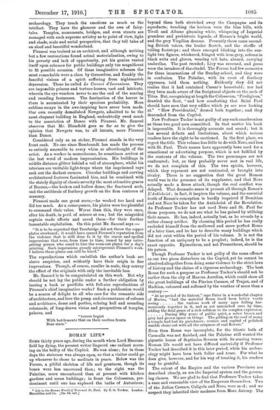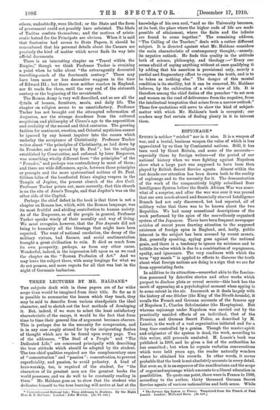ROMAN LIFE.*
SOME thirty years ago, during the month when Lord Beacons- field lay dying, the present writer lingered one radiant morn- ing on the belfry of the Capitol. He was alone ; for in those days the staircase was always open, so that a visitor could go up whenever he chose to meditate in peace. Below was the Forum, a pitiful skeleton of life and greatness, though its bones were less uncovered then ; to the right was the Palatine, more encumbered than at present with kitchen gardens and mean buildings ; in front the Colosseum, pre- dominant until one has explored the baths of Antoninus ; • Life in the Roman World of Nero and St. Paul. By T. G. Tucker, London: Macmillan and Co. i.128. 6d. net.]
beyond them both stretched away the Campagna and its aqueducts; touching the horizon were the blue bills, with Tivoli and Albano gleaming white, whispering of Imperial grandeur and prehistoric legends, of Horace's bright world, and the grey Virgilian dreams. Presently there came ascend- ing British voices, the louder Scotch, and the shuffle of toiling footsteps ; and there emerged blinking into the sun- light two figures, whiskered, fringed with iron-grey, solemn in black suits and gloves, wearing tall hats, absurd, carrying - umbrellas. The past receded ; Livy was reversed, and geese were the invaders of the citadel. The Forum had few memories for these incarnations of the Sunday-school, and they were in confusion. The Palatine, with its crest of feathery cypresses, told them nothing. Evidently they did not realise that it had contained Caesar's household ; nor had they been made aware of the Scriptural objects on the arch of Titus. But, -recognising at length the Colosseum, "Prodigious," drawled the Scot, "and how comforting that Saint Paul should have seen that very edifice which ye are now looking at." "How Providential," droned both together ; and they descended from the Capitol.
Now Professor Tucker is not guilty of any such anachronism as those two good men committed. In that matter his book is impeccable. It is thoroughly accurate and sound; but it has several defects and limitations, about which serious
readers have the right to be cautioned. In the first place, we regret the title. This volume has little to do with Nero, and less with St. Paul. Their names have apparently been used for a sensational or advertising purpose, which is not fulfilled by the contents of the volume. The two personages are not confronted ; but, as they probably never met in real life, we do not complain of this. The two spirits, however, which they represent are not contrasted, or brought into
rivalry. There is no suggestion that the great Roman world was in the presence of its supplanter, and that Nero actually made a fierce attack, though the real conflict was delayed. That dramatic sense is present all through Renan's L'Antiehriet ; in fact, it inspires the volume, and the essential
truth of Renan's conception is hardly impaired if Domitian and not Nero be taken for the Antichrist of the Revelation.
As Professor Tucker has not used Nero and St. Paul for these purposes, we do not see what he has gained by utilising their names. He has, indeed, actually lost, as he reveals by a
rather clumsy artifice. By choosing this period he has really excluded himself from the mellowed and more perfect Rome of a later time, and be has to describe many buildings which did not exist within the period of his volume. It is not the function of an antiquary to be a prophet ; indeed, he is the exact opposite. Epimetheus, and not Prometheus, should be his patron.
Though Professor Tucker is not guilty of the same offence as our two pious disturbers on the Capitol, yet he cannot be absolved altogether from doing some violence to the strict laws of history and the claims of a rigorous archaeology. The best Rome for such a purpose as Professor Tucker's should not be earlier than the city of Marcus Aurelius, which could show all the great buildings of the Flavian Caesars, of Trajan, and of Hadrian, coloured and softened by the weather of more than a century :—
" At no period of its history," says Pater in a wonderful chapter of Marius, "had the material Rome itself been better worth seeing the various work of many ages falling har- moniously together in it, and as yet untouched save by time, adding the final grace of a rich softness to its complex expression.
During fifty years of public quiet, a sober brown and grey had grown apace on things. The gilding on the roof of many a temple had lost its garishness: cornice and capital of polished marble shone out with all the crispness of real flowers."
Even then Rome was incomplete, for the titanic bath of Caracalla was not finished, and the Palatine still wanted the
gigantic house of Septimius Severus with its soaring tower. Roman life would not have differed materially if Professor
Tucker had described it in this later period, while his archae- ology might have been both fuller and truer. For what he does give, however, and for his way of treating it, his readers may be grateful. The extent of the Empire and the various Provinces are described clearly, as are the Imperial system and the govern- ing classes. We are glad to find that Professor Tucker takes a sane and reasonable view of the Emperors themselves. Two of the Julian Caesars, Caligula and Nero, were m td ; and we suspect they inherited their madness from Marc Antony. The others, undoubtedly, were libelled; or the State and the form of government could not possibly have subsisted. The libels of Tacitua confute themselves ; and the motives of aristo- cratic hatred for the Principate are obvious. When it is said that Suetonius had access to State Papers, it should be remembered that his personal details about the Caesars are precisely the kind of matter which never finds its way into official documents.
There is an interesting chapter on "Travel within the Empire," though we think Professor Tucker is straining a point when he talks about "the extravagantly decorated travelling-coach of the fourteenth century." There may have been more or less decorative waggons in the time of Edward III.; but there were neither coaches in England, nor fit roads for them, until the very end of the sixteenth century or the beginning of the seventeenth.
The Roman Army is very well described, and so are all the details of houses, furniture, meals, and daily life. The chapter on religion seems to us unsatisfactory. Professor Tucker has not brought out the attempted reformation of Augustus, nor the strange decadence from the cultured scepticism and philosophy of Cicero's age to the superstition and credulity of the second and third centuries. The growing fashion for sentiment, emotion, and Oriental mysticism cannot be ignored by any honest inquirer into the causes which underlay the acceptance of Christianity. Professor Tucker writes about "the principles of Christianity, as laid down by its Founder, and as spread by St. Paul " ; but the religion established by Constantine, and enforced by later Emperors, was something wholly different from "the principles" of the "Founder," and perhaps was contradictory to most of them ; and there are wide differences, again, between those principles or precepts and the more systematised notions of St. Paul. Gibbon talks of the barefooted friars singing vespers in the Temple of Jupiter, the present church of the Ara Coe/i. Professor Tucker points out, more correctly, that this church is on the site of Juno's Temple, and that Jupiter's was on the other side of the Capitol.
Perhaps the chief defect in the book is that there is not a chapter on Roman law, which, with the Roman language, was its most fruitful and abiding contribution to human society. As of the Emperors, so of the people in general, Professor Tucker speaks wisely of their morality and way of living. We must recognise, however, that the Paz Augusta did not bring to humanity all the blessings that might have been expected. The want of national emulation, the decay of the military virtues, bad finance, and social sentimentalism brought a great civilisation to ruin. It died as much from its own prosperity, perhaps, as from any other cause. Wonderful, indeed, is the impression left upon us as we read the chapter on the "Roman Profusion of Art." And we may leave the subject there, with many longings for what we do not possess, and more regrets for all that was lost in the night of Germanic barbarism.























































 Previous page
Previous page